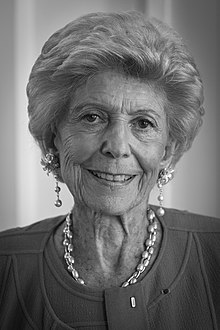Hélène Carrère d'Encausse
| Hélène Carrère d'Encausse | |
|---|---|
 |
|
| Born |
Hélène Zourabichvili 6 July 1929 Paris, France |
| Occupation | Historian |
| Known for | Member of the Académie française |
| Spouse(s) | Louis Carrère (m. 1952) |
| Children | 3 |
Hélène Carrère d'Encausse (born 6 July 1929 in Paris as Hélène Zourabichvili) is the permanent secretary of the Académie française and a historian specializing in Russian history. She was a recipient of Lomonosov Gold Medal in 2008.
Carrère d'Encausse is a graduate of the elite Institut d'Études Politiques de Paris (Sciences Po).
She was elected to seat 14 of the Académie française in 1990, and her academician's sword was made by the sculptor Goudji. She became permanent secretary on 21 October 1999.
In her book L'Empire éclaté published in 1978 she predicted the dissolution of the Soviet Union.
Her son, Emmanuel Carrère (born 1957), is an author, screenwriter and director.
She was awarded Grand Cross with Star of the Order of Merit of the Republic of Poland (2011).
Hélène Carrère d'Encausse, considered one of the most eminent historians of France, joined other French politicians in identifying polygamy as one of the causes of the 2005 civil unrest in France in a November 2005 interview given to Russian television channel NTV:
Why can't their parents buy an apartment? It's clear why. Many of these Africans, I tell you, are polygamous. In an apartment, there are three or four wives and 25 children.
These and similar remarks by others, including Nicolas Sarkozy and Bernard Accoyer, were disputed by the antiracist group MRAP, which blamed the unrest on French racism.
In another context, she remarked: "It's true that the Russian television follows Putin step by step. But French television is so politically correct it is a nightmare. We have laws Stalin could have thought up. . . People cannot express an opinion about ethnic groups, the Second World War, and plenty of other things. You’ll be quickly convicted of a crime."
...
Wikipedia
